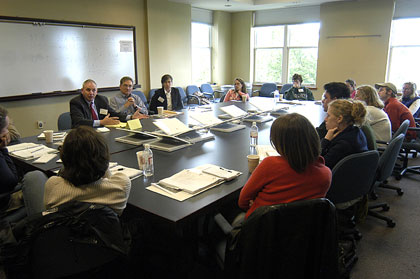Peter Lord, at left in shirtsleeves, talked to Metcalf Institute fellows in 2007 with Providence Journal publisher Joel Rawson and me (in black blazer to Pete’s left)

My colleague and friend, Peter B. Lord, has been fighting brain cancer. He is only 60 years old and was working full-tilt at the Providence Journal last May when he had his first seizure. Brain tumors are like this. They come out of nowhere, it seems.
Pete deserves a tribute. And I wish I could show him a draft before I post this, because he would make me improve on it. Pete always nudged his colleagues and students—and me, who always asked him for advice—toward good stories. I’d mention something about waste or sewage. He’d say, “What are you waiting for? Get on that story!”
I have been asking Pete for writing help since 1997, when I started covering the environment at The Day of New London. My editor told me to call Pete at the Providence Journal and ask him how to structure the beat. Pete told me where to look for stories, who to cultivate as sources. He cared about good environmental coverage and insisted that I care, too. I was accepted into the first class of fellows at the brand-new Metcalf Institute for Marine and Environmental Reporting in 1999. I arrived in Rhode Island to find Peter was the journalism co-director and had helped set up the fellowship. When I became a freelancer in 2000, I asked Pete if he’d be an informal mentor. Could I call him for advice now and then? Would he look at stories and be tough yet not too mean? He agreed.
The last time he set me on the right course with a story was several weeks before his seizure. I had emailed him a draft about wind power in Connecticut. Pete replied:
“This strikes me as one of those cases where you know so much, you forget that your readers aren’t there with you.
“The first eight paragraphs are filled with facts and figures, but they don’t mean anything to me. I don’t have the background to interpret them.”
Ouch! And—he was right! But he encouraged me, instead of shooting me down. In my draft, he picked out what should be my lead and encouraged me to move it higher:
Pete summarized what he’d picked out of my bumpy draft: “New data on wind speeds around Connecticut show that many more sites than previously believed could be economically viable. Wind power can work in low lying areas, not just the higher elevations in northwestern Connecticut. This information is prompting new proposals and inquiries. It means Connecticut may be able to generate as much as 10 times more wind energy than previously believed. That’s big news.”
And, encouragingly: “Good story. But I would say the details you have at the top of your story should be at the bottom, as background, explanatory material. I hope that helps.”
I rewrote the story, following his suggestion for the lead. My editor had tried to say the same thing, but he and I weren’t understanding each other. Pete commiserated with me, joking that editors are always asking for something else and then they might cut it from the story.
After my rewritten story posted, I sent it to him. Here’s what Pete wrote back:
“Wow. That’s a dramatically better story. Nice job!”
Thanks, Peter, for 15 years of friendship and help. Seldom do I go into a story without hearing your voice saying something like, “Well, get on the phone and call those guys. Get on the story.”
